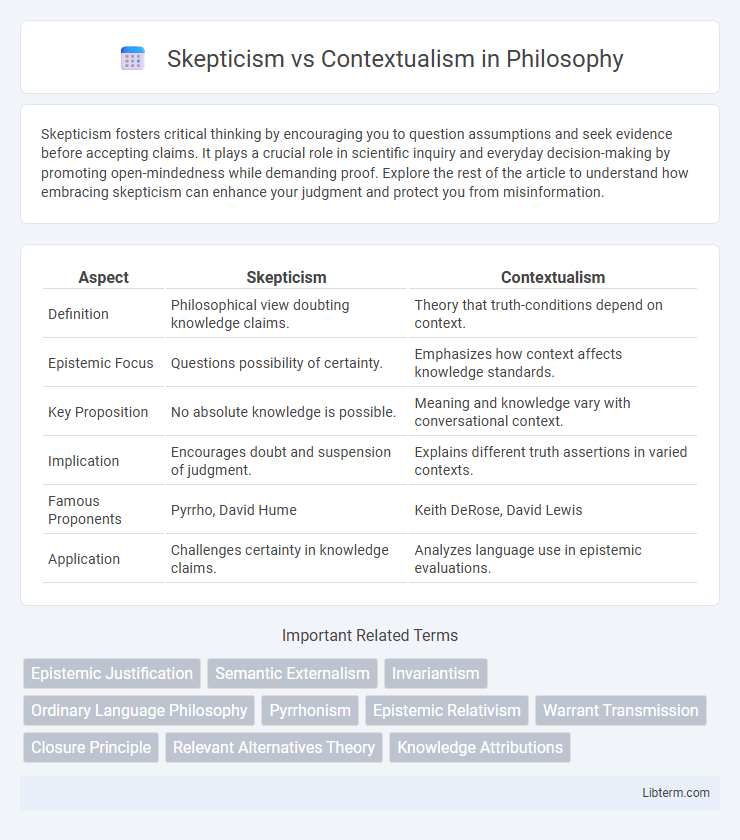Skepticism fosters critical thinking by encouraging you to question assumptions and seek evidence before accepting claims. It plays a crucial role in scientific inquiry and everyday decision-making by promoting open-mindedness while demanding proof. Explore the rest of the article to understand how embracing skepticism can enhance your judgment and protect you from misinformation.
Table of Comparison
| Aspect | Skepticism | Contextualism |
|---|---|---|
| Definition | Philosophical view doubting knowledge claims. | Theory that truth-conditions depend on context. |
| Epistemic Focus | Questions possibility of certainty. | Emphasizes how context affects knowledge standards. |
| Key Proposition | No absolute knowledge is possible. | Meaning and knowledge vary with conversational context. |
| Implication | Encourages doubt and suspension of judgment. | Explains different truth assertions in varied contexts. |
| Famous Proponents | Pyrrho, David Hume | Keith DeRose, David Lewis |
| Application | Challenges certainty in knowledge claims. | Analyzes language use in epistemic evaluations. |
Defining Skepticism: Core Principles
Skepticism centers on doubting the possibility of certain knowledge, questioning whether humans can truly know anything beyond subjective experience. Core principles include the challenge to epistemic certainty, emphasizing the limits of perception and reason to provide infallible justification. This philosophical stance contrasts sharply with contextualism, which argues that knowledge standards vary depending on the context of the inquiry.
Understanding Contextualism: Key Concepts
Contextualism asserts that the truth conditions of knowledge attributions vary depending on the speaker's context, highlighting how standards for "knowing" shift with different contexts. This theory addresses skepticism by showing that knowledge claims change dynamically rather than being fixed absolute judgments. Key concepts include indexicality of knowledge, variability of epistemic standards, and the influence of practical stakes on truth conditions.
Historical Background of Skepticism
Ancient Skepticism originated with Pyrrho of Elis in the 4th century BCE, emphasizing suspension of judgment due to the uncertainty of knowledge. Academic Skepticism, developed by Plato's Academy, argued that certain knowledge is impossible, influencing later philosophical debates. This historical foundation shaped modern epistemological discussions, contrasting with Contextualism's focus on the variability of knowledge claims based on conversational contexts.
Evolution and Origins of Contextualism
Contextualism emerged as a response to traditional skepticism by emphasizing that knowledge ascriptions depend on varying contexts, reflecting shifts in linguistic and epistemological analysis during the late 20th century. Rooted in ordinary language philosophy and influenced by works of David Kaplan and Stewart Cohen, contextualism evolved by challenging the fixed standards of knowledge claims, proposing that these standards fluctuate based on conversational contexts. This shift addressed skepticism's rigid doubt by introducing a dynamic framework that accounts for how context shapes the truth-conditions of knowledge statements.
Comparing Epistemic Standards
Skepticism and contextualism differ primarily in their approach to epistemic standards, with skepticism maintaining consistently high standards for knowledge claims that often result in doubting or rejecting knowledge. Contextualism, however, argues that epistemic standards shift depending on the context, allowing for knowledge claims to be accepted in everyday situations but reevaluated under more rigorous scrutiny. This flexibility in contextualism contrasts sharply with skepticism's rigid threshold, highlighting the debate over whether knowledge standards are fixed or variable across different conversational settings.
Major Debates: Skepticism vs Contextualism
Skepticism challenges the possibility of certain knowledge by arguing that knowledge claims require absolute justification, which is often unattainable. Contextualism counters this by asserting that the standards for knowledge vary depending on the conversational context, allowing for knowledge claims to be true in everyday situations but not in skeptical scenarios. The major debate revolves around whether knowledge attributions are fixed and universally applicable, as skeptics argue, or context-dependent and fluid, as contextualists maintain.
Impact on Knowledge Attribution
Skepticism challenges knowledge attribution by asserting that external world doubts undermine certainty in claims, making knowledge nearly impossible to achieve. Contextualism modifies knowledge attributions based on varying standards in different conversational contexts, allowing truth claims to be appropriate in everyday situations while tightening criteria in skeptical scenarios. The debate impacts epistemology by influencing how philosophers interpret the conditions under which statements like "knowing" are correctly applied, shifting between universal skepticism and context-sensitive understanding.
Responses to Skeptical Challenges
Responses to skeptical challenges vary significantly between Skepticism and Contextualism, with Skepticism doubting the possibility of certain knowledge entirely. Contextualism responds by adjusting the standards of knowledge attribution based on the conversational context, allowing for ordinary knowledge claims to stand in everyday situations while acknowledging higher standards in skeptical scenarios. This nuanced approach effectively deflects skeptical arguments without conceding that knowledge is unattainable.
Contextualism in Contemporary Epistemology
Contextualism in contemporary epistemology asserts that the standards for knowledge attributions vary depending on the context of the speaker, allowing for flexible interpretations of knowledge claims. This approach effectively addresses skeptical challenges by shifting the criteria for knowing based on conversational contexts rather than holding fixed truth conditions. Philosophers such as David Lewis and Keith DeRose have advanced contextualism to reconcile everyday epistemic practices with philosophical scrutiny.
Practical Implications and Future Directions
Skepticism challenges the possibility of genuine knowledge by raising doubts about our justification methods, leading to cautious decision-making and conservative belief systems in practical contexts. Contextualism, by contrast, adjusts the standards of knowledge attribution based on varying situational factors, promoting flexibility in interpreting evidence and enhancing adaptability in real-world problem solving. Future directions involve integrating contextualist models with cognitive science to refine epistemic standards and developing AI systems capable of context-sensitive reasoning to better navigate uncertainty in complex environments.
Skepticism Infographic

 libterm.com
libterm.com